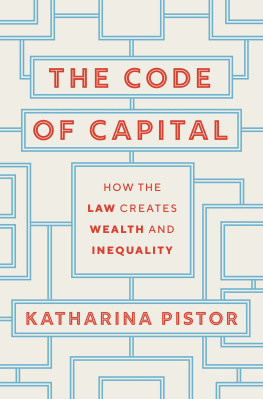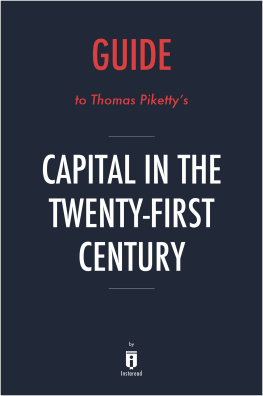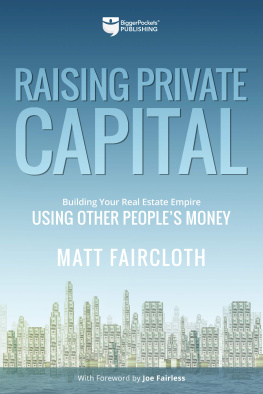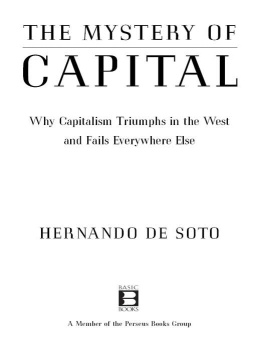
THE CODE OF CAPITAL
The Code of Capital
How the Law Creates
Wealth and Inequality
Katharina Pistor
PRINCETON UNIVERSITY PRESS
PRINCETON AND OXFORD
Copyright 2019 by Katharina Pistor
Requests for permission to reproduce material from this work
should be sent to
Published by Princeton University Press
41 William Street, Princeton, New Jersey 08540
6 Oxford Street, Woodstock, Oxfordshire OX20 1TR
press.princeton.edu
All Rights Reserved
LCCN: 2018965763
ISBN 978-0-691-17897-4
British Library Cataloging-in-Publication Data is available
Editorial: Joe Jackson and Jackie Delaney
Production Editorial: Nathan Carr
Production: Jacquie Poirier
Publicity: Caroline Priday and James Schneider
Copyeditor: Karen Verde
This book has been composed in Adobe Text Pro and Gotham
Printed on acid-free paper.
Printed in the United States of America
10 9 8 7 6 5 4 3 2 1
To Carsten
CONTENTS
PREFACE
The idea for this book has been with me for quite some time. It first emerged when, in the fall of 2007, the global financial system began to teeter toward the abyss. The speed of the unfolding crisis left little time for deep thinking, but once the eye of the storm had passed, I, along with many others, sought to discover what might explain finances stupendous expansion in recent decades, and what accounted for its steep fall. Together with collaborators from different disciplines, I aimed to unpack the institutional structure of different segments of financial markets, one at a time. To me, the most revelatory part of our findings was how familiar the basic building blocks of the financial system looked, notwithstanding the fanciful assets that had been created more recently and the systems unparalleled complexity. Everywhere we probed a little deeper, we found the core institutions of private law: contract, property, collateral, trust, corporate, and bankruptcy law. They had powered the expansion of markets in financial assets, but, as it turned out, they were also key determinants in their undoing. When actual returns on these assets started falling behind expected returns, asset holders enforced their legal entitlements: they made good on the collateral calls, credit lines, repo contracts, and bankruptcy safe harbors, and in doing so, they helped deepen the crisis. Some still got out in time, but many others found themselves with assets that no one would take, except the central banks of select countries.
Having identified the core modules of our complex financial system, I began to trace their roots back in time. I investigated the evolution of property rights, of simple debt instruments, the various forms of pledges and gages that were used to collateralized debt obligations, the evolution of the use and the trust, the corporate form and the history of bankruptcy, the critical juncture when decisions over life and death in economic life are made. The more I read, the more I was convinced that what had started as an investigation into global finance had led me to the fountain of wealth, the making of capital.
This book is the result of that journey. Capital, I argue in this book, is coded in law. Ordinary assets are just thata plot of land, a promise to be paid in the future, the pooled resources from friends and family to set up a new business, or individual skills and know-how. Yet every one of these assets can be transformed into capital by cloaking it in the legal modules that were also used to code asset-backed securities and their derivatives, which were at the core of the rise of finance in recent decades. These legal modules, namely contract, property rights, collateral, trust, corporate, and bankruptcy law, can be used to give the holders of some assets a comparative advantage over others. For centuries, private attorneys have molded and adapted these legal modules to a changing roster of assets and have thereby enhanced their clients wealth. And states have supported the coding of capital by offering their coercive law powers to enforce the legal rights that have been bestowed on capital.
This book tells the story of the legal coding of capital from the perspective of the asset: land, business organizations, private debt, and knowledge, even natures genetic code. I do not trace every turn in the evolution of the law, the twists and tweaks that were necessary to ensure that the old coding techniques would fit the new asset. For lawyers, these details are immensely gratifying, but for outsiders they add a level of detail and complexity that is not necessary to grasp the basic idea about how law creates wealth as well as inequality. Moreover, there exists a rich literature that traces the evolution of select legal institutions, such as the trust, the corporate form, or collateral law. Readers who wish to follow up on this will find some guidance in the citations provided in the notes. I ask for understanding from the legal historians and experts on the relevant legal domains for the simplifications I felt compelled to make to ensure that the book would be accessible to non-lawyers. These are the readers I had in mind while writing the book, readers who might not ever have opened a book about the law for fear that it would be too dry and complicated, or perhaps just not relevant. I have tried to make the legal institutions not only accessible, but also interesting and relevant for current debates about inequality, democracy, and governance. The law is a powerful tool for social ordering and, if used wisely, has the potential to serve a broad range of social objectives; yet, for reasons and with implications that I attempt to explain, the law has been placed firmly in the service of capital.
Many people have accompanied me on my journey to write this book. My colleagues at Columbia Law School encouraged me to write a book, not just an article, when I first presented my ideas at a faculty workshop four years ago. My students at Columbia Law School are always the first ones on whom I try out my new ideas. They are smart and forthright in their ideas and critiques, and I have learned a ton from them over the years, teaching them, as it were, the intricacies of corporate law, financial assets and their regulation, but also the role of law in development outside the capitalist economies of the West. I have also enormously benefited from conversations with former students and alums who are successful practitioners. Some even joined me in my teaching endeavors and shared insights with me and my students that are available only to insiders of the practice of law.
The book also greatly benefited from the research projects and workshops that were held under the auspices of the Center on Global Legal Transformation, which I direct at Columbia Law School. I am most grateful to the funders, in particular the Institute for New Economic Thinking (INET) and the Max Planck Society jointly with the Alexander von Humboldt Foundation.
Writing a book can be a rather lonely endeavor. Luckily, I was given many opportunities to share early ideas and test them on different audiences. Among these were the Buffett Institute at Northwestern University, Chinese University of Hong Kong, ETH Zurich, Goethe University in Frankfurt, Humboldt University of Berlin, Inter-disciplinary Center Herz-liya in Tel Aviv, KU Leuven (where I had the honor of giving the Dieter Heremans Fund Lectures in Law and Economics in 2016), the London School of Economics, Oxford University, Tel Aviv University Faculty of Law, as well as participants at annual meetings of the Global Conference on Economic Geography, the Global Corporate Governance Institute, and WINIR, the World Interdisciplinary Network for Institutional Research. The comments and feedback I received at these venues from colleagues and students helped to clarify my arguments and saved me from many errors and wrong turns.
Next page








